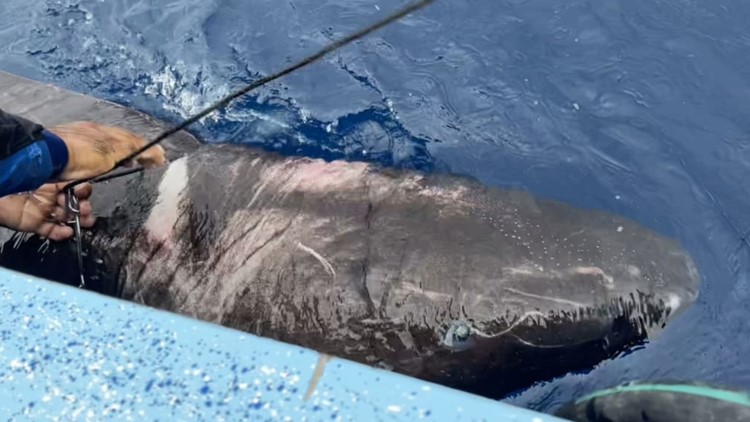ST. PETE BEACH, Fla. — Half-blind, ancient, sluggish, what kind of shark is this?
This is the question Florida International University Ph.D. candidate Devanshi Kasana and Belizean fisherman was phased with when a Greenland shark turned up on their line while tagging tiger sharks near a coral reef off Belize.
The shark typically lives in freezing Arctic waters, Mote Marine Laboratory & Aquarium said in a news release. Kasana said it was unlike any shark she'd seen before.
"At first, I was sure it was something else, like a six gill shark that are well known from deep waters off coral reefs,” Mote reports Kasana said. "I knew it was something unusual and so did the fishers, who hadn’t ever seen anything quite like it in all their combined years of fishing."
The shark looked aged, "ancient, even," Mote said in the news release. Half blind with a blunt snout and small pale bluish-colored eyes, it led them to believe it was part of the sleeper shark family.
Kasana's Ph.D. advisor and Director of Sharks & Rays Conservation Research at Mote Marine Laboratory & Aquarium, Demian Chapman, is who told her it looked a lot like a Greenland shark. And after discussing with several Greenland shark experts, it was finally determined to be a Greenland shark or a hybrid between that and a Pacific sleeper shark.
Greenland sharks are somewhat a mystery to scientists. It's estimated that the species can live upward of 400 years, "earning them the special designation of longest-living vertebrate known to science."
The slow-moving sharks typically live in greater depths and with little knowledge of them experts believe they could be found all over the world, although they prefer low temperatures, Mote says.
"The waters where Kasana and the fishermen found the shark certainly get deep. Glover’s Reef Atoll — part of the Glover’s Reef Marine Reserve World Heritage Site, a marine protected area (MPA) — sits on top a limestone platform, forming a lagoon surrounded by a coral reef," Mote reports. "Along the edges of the atoll there’s a steep slope that drops from 1,600 feet to 9,500 feet deep, which means there is cold water needed for a Greenland shark to thrive."
Chapman has been tracking shark populations at Glover's Reef for nearly two decades. Belizean fisherman Omar Faux said he wasn't expecting to see a Greenland shark, but knows there's more to be discovered.
"I am always excited to set my deep water line because I know there is stuff down there that we haven’t seen yet in Belize, but I never thought I would be catching a Greenland shark," Faux said.
Chapman said if they catch another sleeper shark, he's buying lotto tickets.



